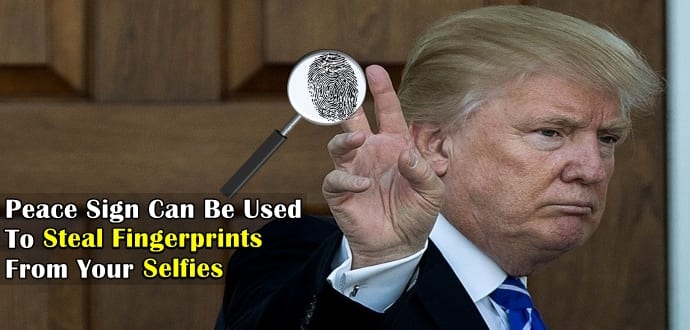Security Researcher Cautions Against Striking Japan’s Favorite Picture Pose That Could Steal Your Identity
The last few years has seen an upsurge in a strange phenomenon called the “selfie”. Powerful cameras and vast reach of social media along with expansion of mobile technology have contributed to making “selfies” a craze.
While selfies can be fun, it can put one in dangerous situation too. Besides, being responsible for many selfie related deaths, did you know that your selfie could put you up for identity theft too, albeit a certain pose?
According to a security researcher from Japan, a particular picture pose that is very popular among Asians, can set you up for a disaster. The pose in question is the flashing of the peace (V or victory) sign in a selfie. Apparently, doing this exposes two fingerprints, which may possibly lead to identity theft.
Isao Echizen, a professor at the Digital Content and Media Sciences Research Division of the National Institute of Informatics, told that he could successfully obtained fingerprints from photos of exposed fingers taken from up to three metres (9.8 feet) away. Based on his experiments, taking a selfie while giving a peace sign may, in fact, put your fingerprint data, and your identity, at risk.
For several people, holding up two fingers to make a V or peace sign while smiling for the camera is celebratory in nature. The pose, which apparently started in Japan in the late 1980s, has since wildly spread throughout Asia and some other parts of the world. As a result, Echizen has specifically warned against the rampant peace sign pose that is popular in Japan.
For instance, if you’re using one hand to take the picture, Echizen says it’s wise to keep the fingertips of the other out of frame. Considering that the fingerprint technology is being widely used nowadays, from smartphone locks to computers to security entrances, people should be extra careful with the sign they pose for the selfie. That’s because image quality from current consumer camera technology has already progressed to such a level that your fingerprint data can be derived from a photo of your fingertips, Echizen says.
However, Echizen’s team at the National Institute of Informatics have developed a fingerprint anti-theft prevention technology. The titanium-oxide based substance can obscure and even generate false images of any fingerprints that find their way into frame.
According to Echizen, if someone hacks your password, you can change it, but with biometric security like fingerprint or retina you cannot do much as you are born and stuck with it.
Source: CNET

